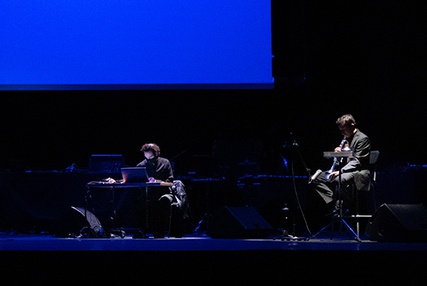Improvise cum machina 1/2
Le 3 décembre dernier, au cours du Grand Soir Numérique qui s’est tenu à la Philharmonie de Paris dans le cadre de la Biennale Nemo des Arts Numériques, trois solistes de l’Ensemble intercontemporain (le trompettiste Lucas Lipari-Mayer, le contrebassiste Nicolas Crosse et le percussionniste Samuel Favre) se sont pour la première fois prêtés à l’expérience d’improviser avec une machine. En l’occurrence, il s’agit de l’environnement informatique OMax – dont le développement, par l’équipe Représentations musicales de l’Ircam, se poursuit dans le cadre du projet REACH (pour Raising co-creativity in cyber-human Musicianship), lauréat d’une bourse ERC Advanced Grant 2019. La machine était pilotée par le musicien Benjamin Lévy, qui a lui-même fait partie de l’équipe Représentations musicales. Impressions à chaud de Samuel Favre…
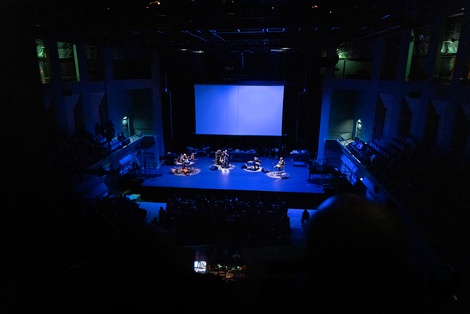
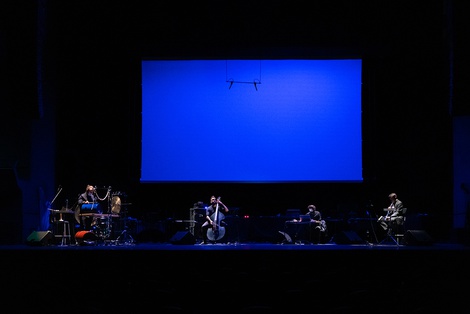
De gauche à droite, sur scène lors du concert Grand soir numérique : le percussionniste Samuel Favre, le contrebassiste Nicolas Crosse, le musicien et chercheur Benjamin Lévy et le trompettiste Lucas Lipari-Mayer © Ircam - Centre Pompidou, photo : Quentin Chevrier
Qu’est-ce qui vous a séduit dans cette idée d’improviser avec la machine ?
Samuel Favre : Nicolas Crosse a été le premier au courant, et nous a demandés, à Lucas et moi-même, si nous voulions participer. N’étant pas un improvisateur régulier, j’ai été intrigué et, sans doute, d’une certaine manière, rassuré par la présence d’une machine, laquelle me semblait apporter toute une dimension de recherche et d’expérimentation, ainsi qu’une grande part d’inconnu. Car, même si je voyais bien comment l’informatique pouvait transformer le son, je n’avais pas imaginé qu’on puisse dialoguer avec un ordinateur qui agisse lui-même comme force de proposition.
On vous a présenté plusieurs environnements logiciels développés par l’équipe Représentations musicales : OMax, SoMax, Improtech, DYCI2… Pourquoi avoir jeté votre dévolu sur OMax ?
S.F. : D’autres programmes nous ont été présentés, et nous avons bien pris conscience des énormes possibilités qu’ils offraient. Cependant, pour être vraiment efficaces, ils demandent une préparation, un travail d’élaboration, quasiment de composition. Ce n’était pas compatible avec l’envie que nous avions d’une improvisation libre. D’autant plus que nous n’avions droit qu’à dix minutes sur scène, ce qui nous semblait manquer de consistance.
Comment avez-vous envisagé et préparé la chose ? Qu’avez-vous cherché et travaillé au cours des répétitions ?
S.F. : Nous nous sommes dès le début orientés vers de l’improvisation pure. Cela nous tenait à cœur. Le travail était essentiellement intuitif. Improvisation, écoute, propositions… Qu’est-ce qui marche bien ? Qu’est-ce qui ne fonctionne pas ? Nous sommes assez vite tombés d’accord sur le fait que nous voulions proposer un éventail de matières sonores, et nous éloigner de sonorités très référencées.
Au départ, j’avais un set de batterie jazz, mais je l’ai rapidement abandonné. Pour le concert, j’avais un waterphone, des bidons, un gong… bref, un assemblage d’instruments hétéroclites.
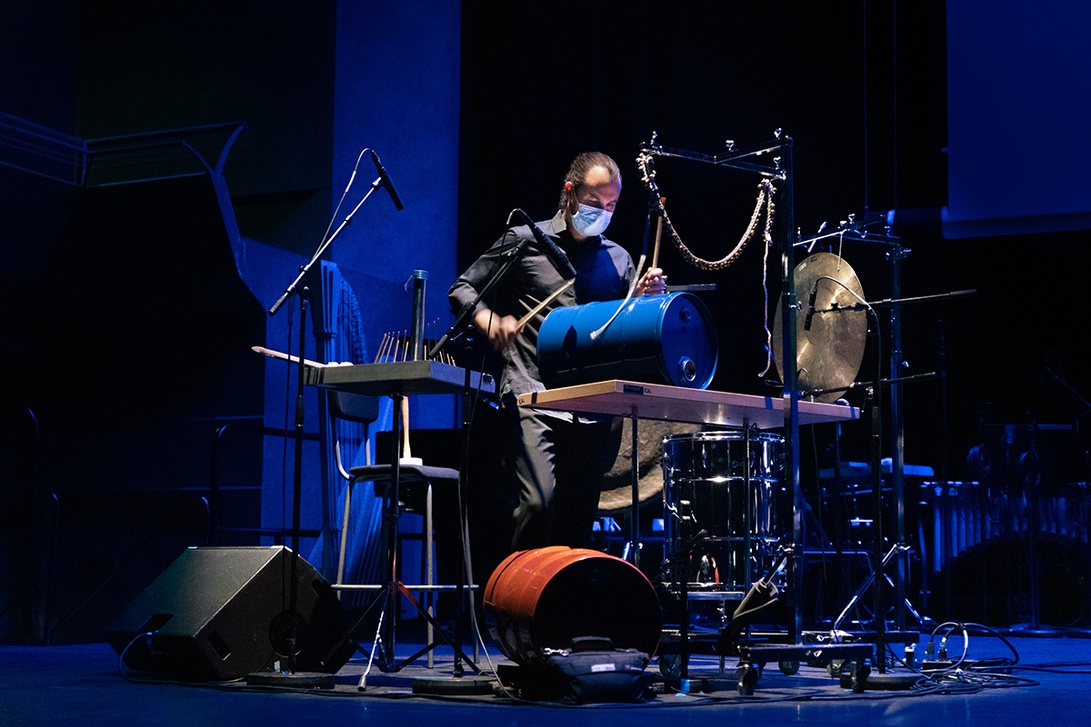
Le percussionniste Samuel Favre, sur scène lors du concert Grand soir numérique © Ircam - Centre Pompidou, photo : Quentin Chevrier
Les propositions et réactions de la machine vous ont-elles surpris ?
S.F. : Oui, sans aucun doute, les premiers essais étaient très déroutants.
Avez-vous eu le sentiment d’interagir véritablement avec une machine ? Quelles différences avec l’improvisation avec un musicien « humain » ?
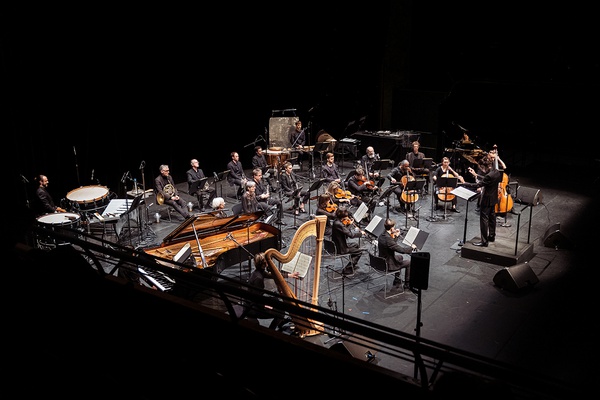 S.F. : Oui, il y a une véritable interaction, la machine est véritablement capable de prendre la parole et de se mêler à la sonorité du groupe, étant donné qu’elle utilise le même matériau que celui que nous jouons. En revanche, elle ne comprend pas le groove, et n’obéit pas à certaines conventions et sensations musicales que nous utilisons instinctivement. On ne peut pas communiquer physiquement avec elle – pas de regard, pas d’énergie corporelle.
S.F. : Oui, il y a une véritable interaction, la machine est véritablement capable de prendre la parole et de se mêler à la sonorité du groupe, étant donné qu’elle utilise le même matériau que celui que nous jouons. En revanche, elle ne comprend pas le groove, et n’obéit pas à certaines conventions et sensations musicales que nous utilisons instinctivement. On ne peut pas communiquer physiquement avec elle – pas de regard, pas d’énergie corporelle.
Y a-t-il des aspects de la machine que vous aimeriez voir développés ?
S.F. : Honnêtement, nous n’avons pas assez exploré le programme lui-même pour avoir des idées quant à son développement. Pour moi, c’était plutôt une initiation.
Si vous renouvelez l’expérience à l’avenir, avez-vous déjà des idées d’axe de travail que vous aimeriez explorer ?
S.F. : Il faudrait construire. Pourquoi pas avec l’aide d’un compositeur. Mais l’improvisation pure impose trop de limites à ce qu’on peut faire. Pour être plus riche et plus surprenante, la machine a besoin d’être paramétrée.
Propos recueillis par Jérémie Szpirglas
Concert retransmis dans l'émission d'Arnaud Merlin, le concert de 20h, sur France musique
![]()
Cette action utilise les recherches et logiciels du projet REACH de l’équipe Représentations musicales de l’Ircam dirigé par Gérard Assayag.



